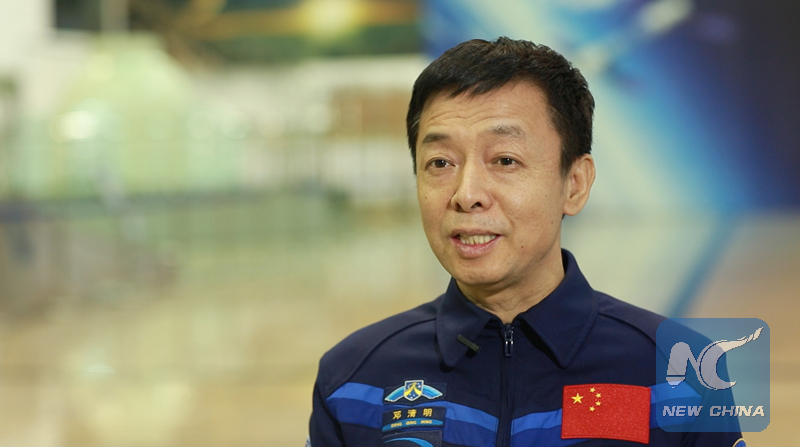
Taikonaut Deng Qingming (Xinhua photo)
On an evening in November 2016, Deng Qingming went home to find his wife and his daughter had prepared a lavish spread of his favorite dishes and wine. He ran to the bathroom, turned on the faucet, and, concealed by the sound of running water, cried like a baby.
Deng is a taikonaut who has never been to space. He was backup to commander Jing Haipeng in Shenzhou-11 mission.
He dried his face and returned to the table, where his wife raised her glass and toasted him: "You are my hero."

Deng Qingming (R) receives training (Xinhua photo)
Deng, 52, was a backup crew member for both Shenzhou-10 and Shenzhou-11 missions. Of China's first batch of 14 trainees for the space program, six never made it onto the crew, including Deng.
Five of his peers retired in 2014 without a space flight, making Deng the last man standing, with his feet on the ground.
This month Taikonaut Corps of celebrates its 20th anniversary. Over the past two decades, 21 taikonauts were selected from the ranks of air force pilots. They have completed six missions, conducted over 100 experiments in space and orbited the earth for a total 68 days and nights.
"Sometimes I ask myself, isn't it my duty to fly into space? If I can't fly, how can I call myself a taikonaut?" Deng says.
When these existential crises come upon him, Deng practices calligraphy, which calms him.
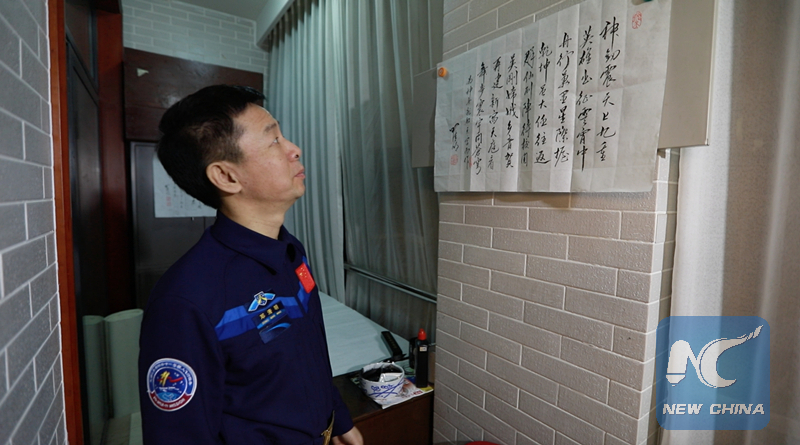
Deng and his calligraphy (Xinhua photo)
"I'm always ready for a mission," he says, still dreaming after 20 years.
"They trained as hard as we did, and they are as good as we are. They just didn't have the opportunity," says Jing Haipeng, who has flown on three missions -- Shenzhou-7, Shenzhou-9 and Shenzhou-11.
"They spent their best years preparing and waiting. They have lived up to their oath they took when joining the career. They are the heroes of our country, too!" he says.
UNREALIZED DREAM
Li Qinglong jokes that the biggest achievement in his career is mastering Russian. In fact, his achievement is much bigger than that. He coached Yang Liwei, who in 2003 became the first Chinese in space, aboard Shenzhou-5.
Li, 56, and Wu Jie, 55, were selected two years before the Taikonaut Corps was set up. They were sent to Russia in 1996 for training.
In Star City near Moscow, the two crammed training courses that normally take four years into just one, learning Russian as they went along. Wu was even certificated as commander of the Soyuz spacecraft.
Wu dreamed of flying a Chinese spacecraft to dock with the Mir Space Station, but it was decommissioned in 2001.
Back to China, they were favorites to first go into space but after the Taikonaut Corps was founded, they were joined by many more candidates.
Wu was back-up on Shenzhou-6 and Shenzhou-7 missions, but his space dreams remain empty.
"You never saw a sad face from us when we failed to be chosen," said Li. "Our determination would only increase, and we would work harder."
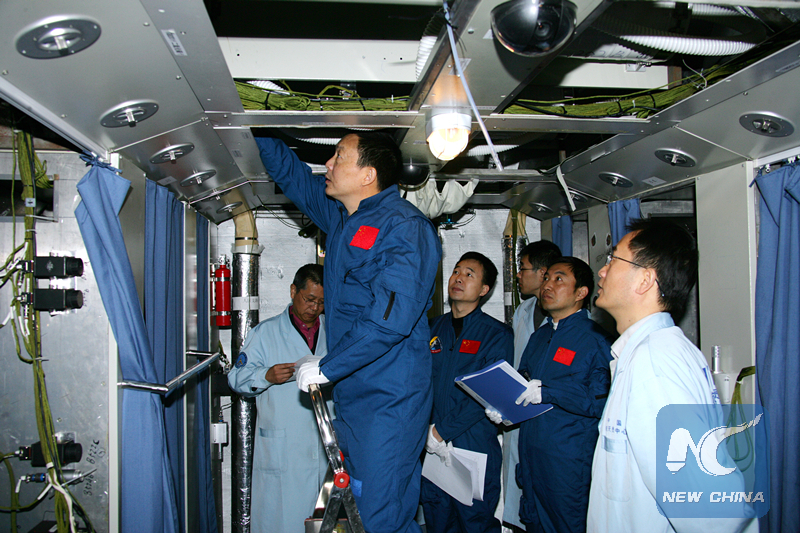
Taikonauts Li Qinglong, Jing Haipeng and Wu Jie receive training in 2002. (photo by Zhu Jiutong)
But the sun set on his career in 2014, with Li and four other taikonauts retired from the team with zero flight hours logged.
"We should always remember their names -- Li Qinglong, Wu Jie, Chen Quan, Zhao Chuandong, and Pan Zhanchun," says Jing Haipeng.
"It is a lifelong regret to be unable to go into space," says Zhao. "But some of us still work for the cause in other positions. Our dream goes on in this regard."
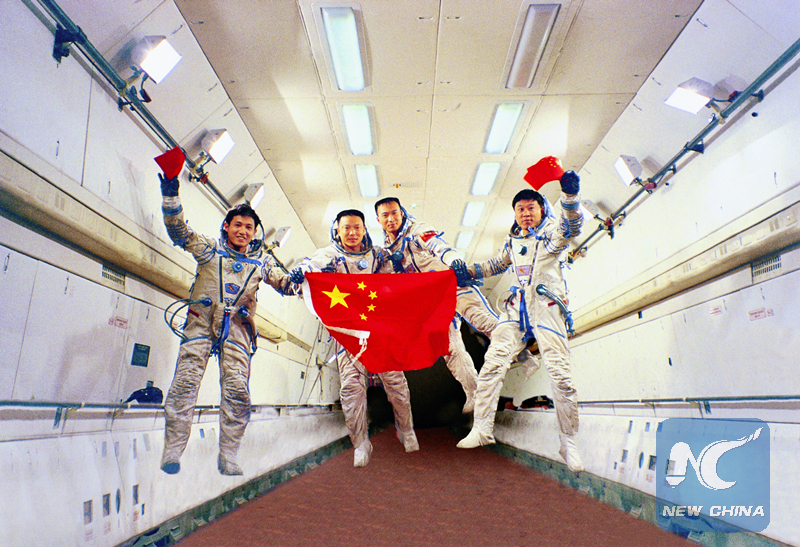
Pan Zhanchun receives training in Russia with Fei Junlong, Zhai Zhigang and Liu Wang in 1999. (photo by Wang Xiaogang)
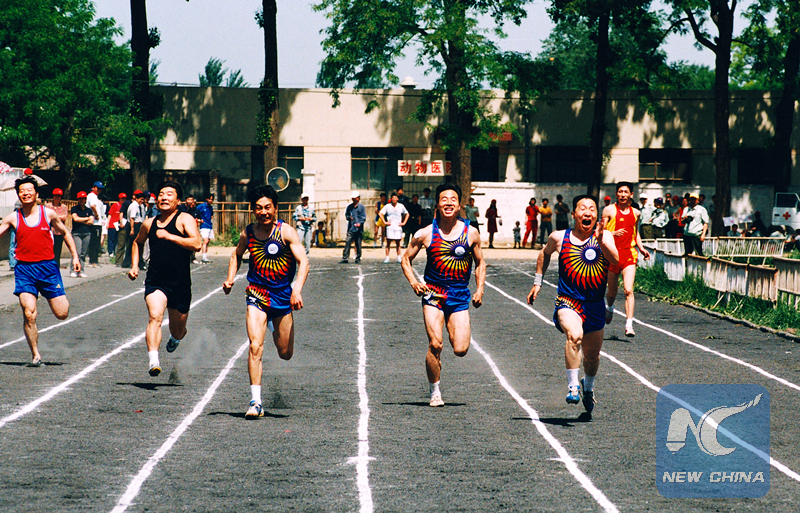
Zhao Chuandong, Yang Liwei, and Jing Haipeng race in a sports meeting in 2002. (photo by Zhu Jiutong)
"DON'T GIVE UP!"
"Be it a crew or backup, it is our job," Chen Quan told Deng on the retirement ceremony. "Don't give up!"
"Being backup doesn't mean you don't need to work. I must watch over closely in the control center and offer all I know about the mission and the spacecraft in case of emergency," Deng says. "Only when the crew returns to Earth will my mission be complete."
During training for Shenzhou-11, Deng, along with crew member Chen Dong were confined in a spacecraft simulator for 33 days, eating space food and enduring the noise of various facilities during his sleep.
"The success of the mission comes before my personal wishes," he said. Deng still believes he has a chance of a mission, and works as hard as any of his teammates.
"I won't give up, as long as I'm here," Deng says.
Deng's passion has inspired his daughter Deng Manqi, who now works for ground control in Beijing.
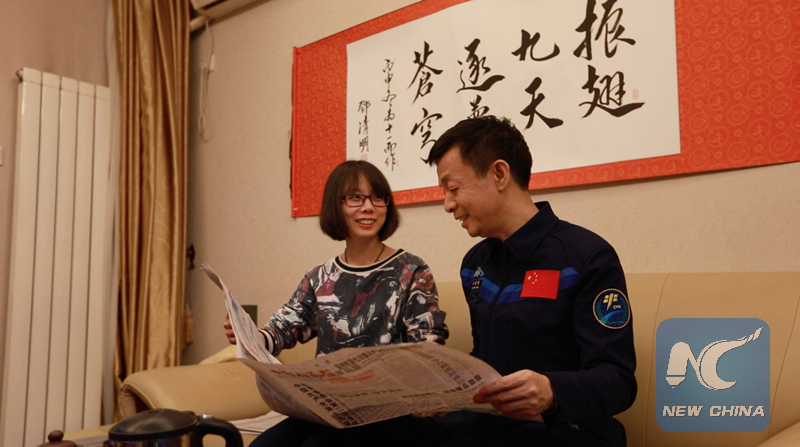
Deng Qingming and his daughter Deng Manqi (L). On the wall is the father's calligraphy, which says, "Fly to the sky; Chase the space dream". (Xinhua photo)
The father hadn't seen his daughter for nearly a year when they met in the Jiuquan Satellite Launch Center during the Shenzhou-10 mission. Under the medical quarantine, he saw his daughter across the barrier every day after dinner. He could hear her shouting ten meters away, "We will work together. Don't give up! Go, daddy, go!"
"My father is the most hardworking, most selfless person I've ever encountered. My dear dad, you will always be the greatest hero in my eyes," she wrote in an article. "Our life and dreams will go on. It's my privilege to work with you."

